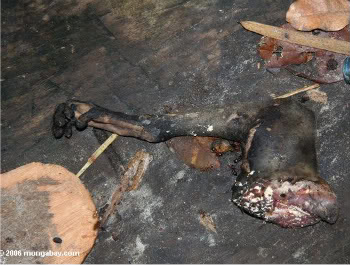Illegal wildlife traders around the world may have a new enemy: DNA barcodes. These short genetic sequences could aid police and customs officials around the world in tracking the origin of confiscated bushmeat and other wildlife products.
A new study in Conservation Genetics uncovered short barcodes of DNA for 25 mammals and reptile species that are threatened by the bushmeat and wildlife trade. These barcodes make it possible for authorities to rapidly identify the species killed for the meat or trade product.
“The species in our study are among the most commercially harvested species in South America and Africa. They are often partially prepared by the time they get to urban markets, which can make the species identification impossible,” says one of the lead authors, Mitchell Eaton from the University of Colorado. “In this study, we tested the usefulness of molecular barcodes for monitoring bushmeat harvest and trafficking in wildlife products. We have shown that the method effectively and unambiguously identifies a large number of species.”
 Severed limb of monkey killed for bushmeat in Gabon. The bushmeat trade is one of the largest threats to mammals worldwide and much of meat is sold illegal outside of the country where it was hunted. Photo by Rhett A. Butler. |
The most difficult product to identify the species proved to be leather. The DNA in processed skin is highly degraded making it troublesome to find the genetic information needed. However, the scientists are hopeful that ever-shorter sequences of DNA may allow even leather to be read accurately.
The study, besides being helpful for wildlife authorities, raises new taxonomic questions for a number of species. The authors found that the African Nile crocodile may in fact be two different species—a western and an eastern, while Peter’s duiker—a forest antelope—may have enough genetic diversity to be split up into separate subspecies or species, although further studies are needed.
The sequences identified in the study will be added to the Barcode of Life Data Systems, an online, open-access library of barcodes for many of the world’s species.
Citation: Mitchell J. Eaton, Greta L. Meyers, Sergios-Orestis Kolokotronis, Matthew S. Leslie, Andrew P. Martin and George Amato. Barcoding bushmeat: molecular identification of Central African and South American harvested vertebrates. Conservation Genetics, 2009; DOI: 10.1007/s10592-009-9967-0
Related articles













